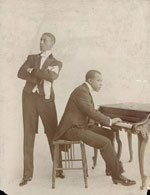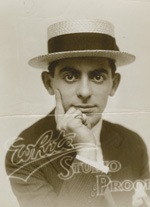The New York
Public Library for the Performing Arts > Vaudeville
Nation
The Music Industries

Bob Cole and
J. Rosamond Johnson

Eddie Cantor.
Proof photograph
by White Studio, NY.
Every vaudeville bill included at least one vocalist or
instrumentalist, and often more. The music publishing industry,
known as "Tin Pan Alley," relied on vaudeville to introduce
new songs and re-popularize older ones. In return, the front
cover of sheet music was decorated with photographs of vaudeville
performers, inscribed with "as introduced by…", "As popularized
by…", or "Performed with great success by…" and a signature. . The
back cover advertised songs of the publisher, songwriter
or genre, generally with an 8-measure sample, with the slogan "Try
this on Your Piano."
Some songwriters also toured as vaudeville performers, among
them Bob Cole and J. Rosamund Johnson, and promoted the sale
of their latest works. Up and coming songwriters who were
expert pianists, like Jerome Kern and George Gershwin, were
employed by publishers as "song pluggers," playing on the
pianos in theater lobbies and lounges to earn themselves
contracts.
Recordings made novelty and ragtime songs popular. Discs
and cylinders all provided 3 to 3 ˝ minutes of music, so
there was time for multiple verses and choruses. Comic singers,
like Eddie Cantor, often added spoken introduction or material
from their monologues to fill the time. Victor, Columbia,
Edison and some of the smaller firms maintained dance bands
and orchestras for recordings of "Fox-Trot Arrangements," medleys
of songs suitable for the newly popular One-steps, Two-steps
and Hesitations.
Related Images